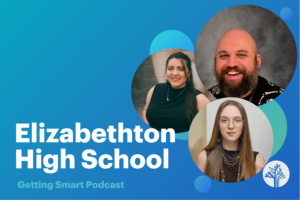Khush CEO Asks, ‘Can Tech Transform Education?’


This week on TechCrunch, Khush CEO Prerna Gupta joined us in scratching our heads over the questions: Why has education fallen so behind other industries in technology adoption? Why is higher education overvalued?
Prerna first points out that the burden of education has been shifted to higher ed because elementary and secondary ed have been falling short. The public sector has struggled to innovate, which is why we’re seeing increased use of private-sector tools and adoption from the bottom up in education.
“I recently had a chance to chat with Dave about why he’s so bullish on the space, and he said, simply, it’s because education is ‘incredibly backwards, and has huge potential for change,'” says Gupta. “He cited a disruptive trend of teachers integrating technology from everyday life into their classrooms voluntarily, rather than technology integration being mandated top-down by administrators.”
Khush has launched apps like Songify, which turns millions of worldwide users’ speech into songs. “Edutainment” apps like Songify are quickly making their way into teachers’ blogs, classrooms, and lessons. According to Gupta, teachers are using the app to engage students in memorizing steps in a process, understanding homonyms, learning historical events, and more.
Gupta looks at the ways blended learning programs with iPads, eReaders, apps, and more are advancing student achievement and performance across a wide variety of subject areas. “We are in a time of convergence: teachers are incorporating technology from their everyday lives to increase student engagement, while visionary administrators are using the momentum of grassroots digital learning movements to move our institutions forward,” she concludes. “Hopefully education will catch up before the Singularity arrives.”
Read the full article “Can Technology Transform Education Before It’s Too Late?” by Prerna Gupta on TechCrunch.






Charlie Mas
I find nothing surprising about the bottom-up use of technology by individual teachers in their classrooms. Teachers have always done this. In fact, all professionals in every industry have always done this. Let's not forget how students are bringing their own technology into the classroom - just as they always have.
I think there the topic - the use of technology in education - is simply overbroad. You might as well try to get your arms around the use of language in education.
Let's narrow it to what is usually meant when people lament or are simply curious about the lack of technology in education. Usually they are referring to the sort of productivity boosting technology that other industries have enjoyed.
We had television classes and video classes since the 70's which leveraged teachers so they could reach millions instead of dozens. It never really caught on, did it? It didn't because it wasn't responsive to individual student needs the way a real, live and present teacher can. Some online learning is starting down that road; students can click on button to get additional explanation or the lesson is repeated if an assessment shows that the student missed a concept or skill. But there are limits to the variety of ways that technology can present the material.
Teaching remains a human endeavor that requires the real-time and real life interaction between a student with all of their individual strengths and weaknesses and that student's relationship with a creative, improvisational professional teacher who knows the student and can find a way to deliver the lesson so the student will get it. That's not work that can be leveraged by technology.
The bulk of students' classroom time, of course, isn't like that. They don't get that much one-on-one attention. They can, however, often get it on demand. There's a lot of school work - by students and by teachers - that doesn't require that level of professional attention and personal relationship. That's why hybrid classrooms and flipped classrooms are so promising. They delegate to the technology those things that the technology does better than the teacher and delegates to the teacher the work that only a teacher can do. Even after this is done, however, the human limits remain. A professional can only sustain about 150 high quality relationships.
So let's not look for technology to replace the teacher - I'm not sure anyone really is - or even necessarily reduce the number of teachers required for each class of students. It's not going to boost productivity that way. Instead, let's look for ways that technology can take over some of the tasks that don't require a creative professional and focus the teacher's time on the more creative and professional tasks. That would be a boost in productivity that would be a greater benefit.
So often our technological advances are used to make things bigger, or faster, or cheaper. They aren't often used to make things better. That's a better place for educational technology to focus. And if there are areas of the work that technology cannot do better, then technology should stay out of them.
Replies
Sarah Cargill
Hi Charlie, Thank you for your thoughtful response here. We agree that hybrid/blended or flipped classrooms show a promising future for digital learning and education. I also would add that the discussion of edtech or the future of personal digital learning shouldn't be a debate of layoffs for laptops, but rather how technology can enhance the role of the human teacher, give students more face time, and increase our ability to personalize learning to each students' needs. We're seeing the potential for a multitude of benefits including Big Data, adaptive learning, 21st century skills, mastery-based learning and education survival among the current economic climate and budget cuts. We envision teachers becoming education designers for their students through the use of technology.
Charlie Mas
It's a shame that I don't see that message out there. It hasn't been stated clearly enough. There are a lot of folks who think that the technology is supposed to replace the teacher with things like online charter schools or Khan Academy instead of math class.
Right now, for technology to teach well it has to anticipate the student. The lesson has to be saved on the server and waiting in case the student clicks A instead of B - like a dating sim game. Only a finite number of responses can be scripted and ready - in fact, a pretty limited number. The problem with this, of course, is that students are human beings and do un-anticipated things all the time. The benefit of having a real-time, responsive professional teacher on site is their ability to react to the un-anticipated student action with an appropriate improvisation. The technology is long way from this.
That's an obvious limitation, but it's more than that. Even if artificial intelligence ever evolves to the point that it can be that responsive, there's the whole relationship thing.
At this point in my evolving understanding of education I'm focusing on student motivation as the primary determinant of academic achievement. Students who come from homes where education is a high priority and is valued get that motivation there. Students find their motivation in countless other places. Motivation, as we all know, is a brittle thing. It's easy to break and hard to rebuild.
If we were to accept the belief that student motivation is the critical determinant to student achievement - at least on a trial basis - then the key to boosting students' academic achievement would be to boost their motivation.
The role of the teachers would shift a bit more to like that of an academic coach. Teachers are already shifting from the "sage on the stage" to become the "guide on the side". That touches on a coach's style of instruction, but it doesn't pay enough credit to a coach's role as motivator.
And what motivates people? Anyone who has read Drive by Daniel Pink knows that people are motivated by autonomy, mastery, and purpose. But only a teacher who actually knows the student can determine which of those in which proportions and variations is right for an individual student. Motivation is not generic; it's personal.
One of the most promising elements of the new education technology - for me - is how it keeps an eye on the students' motivation. The best of the new tech has adopted techniques from MMORPGs to motivate the students to work through exercises that are not, by themselves, fun or interesting. That's wonderful.
Let's keep on message as best we can and be ready to correct our friends as much as anyone else when they mis-speak about edutech. It's not either/or, it's both/and.
Replies
Tom Vander Ark
Charlie, we agree that motivation is a big deal. Appreciate your observation that "it’s easy to break and hard to rebuild."
As I've said frequently on GS, I think motivation sciences will be the source of the most important fundamental breakthroughs in learning during the second half of this decade.